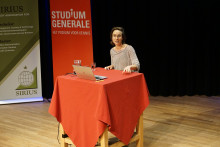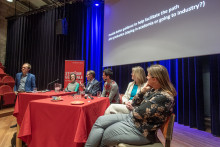Edwards specializes in sociolinguistics and her doctoral thesis focused on English in the Netherlands. She is interested in World Englishes, which is a term referring to localized varieties of English all over the world. ‘Wherever English goes, the locals mold it to fit their culture and way of life,’ explains Edwards.
Mistake or a local flavor?
If new varieties of English really emerge everywhere the language is used, how do we tell a difference between the local variety and a mistake? ‘There are many native and nonnative varieties of English. Native speakers are outnumbered by non-natives, who don’t try to mimic British or American English, but use English to represent their own environment,’ says Edwards. ‘Deviating from native English is not necessarily and error, but can be an appropriate innovation.’
Do people speak Dunglish in the Netherlands?
Does Dunglish exist? To answer that question, we first need to determine what constitutes a legitimate language variety. Edwards says: ‘The criteria of an English variety include widespread competence, expanded functions of the language, identity construction, linguistic innovation and finally local norm orientation towards the language.’ Let´s see if Dunglish fulfils all these criteria.
Widespread competence
It is said that almost everybody in the Netherlands speaks English. Indeed, 90% of Dutch people claim they can hold a conversation in English. ‘Competence in English is assumed and expected in the Netherlands,’ says Edwards. Dutch people often use English words while communicating among each other, and not only in spoken form but also in writing. English words or even entire sentences can be found in official texts, such as news announcements intended for Dutch readers.
English as a part of Dutch culture
English has become a typical feature of an everyday life in the Netherlands. ‘We can see ‘Englification’ of Dutch higher education, English commercials or conferences and work meetings held in English, even when all their participants are Dutch. English doesn’t have an instrumental function, but more of a signaling role – it represents a cosmopolitan and progressive group or culture,’ elaborates Edwards. Yes, English has become an element of the Dutch national culture and identity.
Linguistic innovations
As people accept this English-knowing identity, it gives them a sense of ownership over the language. That leads to linguistic innovations in English grammar, accents or vocabulary. Edwards herself has created a corpus of Dutch English and found some systematic innovations, that might suggest a new variety of English has emerged in the Netherlands.
Dutch don’t aim for Dunglish
Based on all of the above statements, it seems that Dunglish does exist. However, Edwards explains that Dutch English doesn’t fit the last of the mentioned criteria. Dutch people do not aim for a local variety of English. They do speak English and use many English words within Dutch sentences, but they generally aim for a neutral, international form of English, not for creating their own version of it.
‘There is not a lot of sympathy for Dunglish in the Netherlands,’ concludes Edwards. ‘Therefore it is difficult to say if Dunglish truly exists, but there certainly are a lot of interesting things happening with English in the Netherlands. It is not black and white.’







